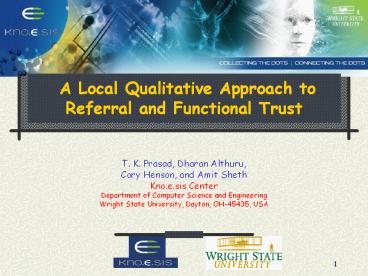A Local Qualitative Approach to Referral and Functional Trust - PowerPoint PPT Presentation
1 / 19
Title:
A Local Qualitative Approach to Referral and Functional Trust
Description:
A Local Qualitative Approach to Referral and Functional Trust T. K. Prasad, Dharan Althuru, Cory Henson, and Amit Sheth Kno.e.sis Center Department of Computer ... – PowerPoint PPT presentation
Number of Views:78
Avg rating:3.0/5.0
Title: A Local Qualitative Approach to Referral and Functional Trust
1
A Local Qualitative Approach to Referral and
Functional Trust
- T. K. Prasad, Dharan Althuru,
- Cory Henson, and Amit Sheth
- Kno.e.sis Center
- Department of Computer Science and Engineering
- Wright State University, Dayton, OH-45435, USA
2
Goal
- Study semantic issues relevant to trust in
- Social Media - Data and Networks
- Sensor - Data and Networks
- Generic Examples involving Trust
- Analysis of online ratings/reviews on TV models
before making purchasing decision from amazon.com
- Seeking recommendations on handy man, car
mechanic, etc. from neighbors
3
Generic Approach
- Propose models of trust/trust metrics to
formalize trust aggregation and trust propagation
to deal with indirect trust - Develop techniques and tools to glean trust
information from - social media data (streams) and networks
- sensor data (streams) and networks
4
Trust in Social Media Networks
5
Previous WorkStructure of Trust
- Trust between a pair of users is modelled as a
real number in the closed interval 0,1 or
-1,1 - Pros Facilitates propagation and computation of
aggregated trust - Cons
- Too fine-grained, total order
- Inherent difficulties in initializing,
understanding, and justifying
computed trust values
6
Quote
- Guha et al
- While continuous-valued trusts are
mathematically clean from the standpoint of
usability, most real-world systems will
in fact use discrete values
at which one user
can rate another. - E.g., Epinions, Ebay, Amazon, Facebook, etc all
use small sets for (dis)trust/rating values.
7
Trust-aware Recommender Systems
- Collaborative Filtering systems exploit
user-similarity to get recommendations. - But suffer from data sparsity problem.
- Adding trust links
- improves quality of recommendations
- benefits cold-start users who most need it
- is robust w.r.t. spamming via engineered profiles
(Shilling Attacks)
8
Our Research
- Propose a model of trust based on
- Partially ordered discrete values (with emphasis
on relative magnitude) - Local but realistic semantics
- Distinguishes functional and referral trust
- Distinguishes direct and inferred trust
- Prefers direct information over conflicting
inferred information - Represents ambiguity explicitly
- HOLY GRAIL Direct Semantics in favor of Indirect
Translations
9
Essential concepts
- Trust Scope Context, Action,
- Functional Trust Agent a1 trusts agent a2s
ability in some context or for doing something - Referral Trust Agent a1 trusts agent a2s
ability to recommend another agent in some
context or for doing something - Trust is a relationship among agents/users,
while belief is a relationship between
agents/users and statements
10
Semantics Interpretation
- Four valued logic
- inconsistent information,
- true, false,
- no information
- Trust / Distrust
- 4-valued binary function among users
- Belief / Disbelief
- 4-valued binary function on users and
statements
11
Example Trust Network - Different Trust Links
and Local Ordering on Trust Links
- Alice trusts Bob for recommending good car
mechanic. - Bob trusts Dick to be a good car mechanic.
- Charlie does not trust Dick to be a good car
mechanic. - Alice trusts Bob more than Charlie, w.r.t. car
mechanic context. - Alice trusts Charlie more than Bob, w.r.t. baby
sitter context.
12
Formalization of Semantics Basis for Trust
Computation Algorithm
13
Formalization Approach
- Given a trust network (Nodes, Edges with Trust
Scopes, Local Orderings), specify when a source
agent can trust, distrust, or be ambiguous about
another target agent, reflecting - Functional and referral trust links
- Direct and inferred trust
- Locality
14
(No Transcript)
15
Similarly for Evidence in support of Negative
Functional Trust.
16
(No Transcript)
17
Quote summarizing potential bug
- The whole problem with the world is that fools
and fanatics are always so certain of themselves,
but wiser people so full of doubts. - --- Betrand Russell
18
Possible Future Extensions
- Trust links with trust-scoped exceptions
- Straddles two extremes involving
- just trust links and just trust-scoped links
- Trust values annotated with trust path length,
target neighborhood summary, etc. - Other forms of trust links formalized using upper
ontology
19
THANK YOU!
- http//knoesis.wright.edu/tkprasad/































